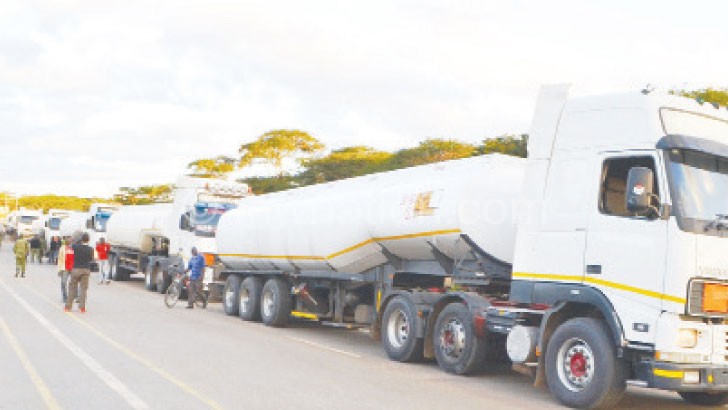Nocma gives in to fuel hauliers
- Resolves to give local tankers 86.3% business from March
In an apparent move to thwart a planned strike by some local fuel hauliers, National Oil Company of Malawi (Nocma) has resolved to give 86.3 percent of fuel haulage business to local transporters effective March 2021.

In an e-mail response last week, Nocma public relations officer Telephorus Chigwenembe said that currently local fuel hauliers transport all the fuel from the port of Beira in Mozambique, which accounts for 60 percent importation quota as Nocma.
He said it is only when local transporters are unable to meet Nocma’s requirements that the State-owned company engages foreign transporters to ensure consistency in fuel supply in the country.
Chigwenembe said: “On the Dar es Salaam route, we use both Malawian and foreign transporters. This engagement of foreign transporters on this route is on account of the legal framework in Tanzania.
“According to Tanzania’s regulations for cross-border cargo haulage, 70 percent of the transportation business is reserved for local transporters in that country. That leaves Malawian transporters with 30 percent. This is unlike in Mozambique where such prescriptions do not exist.”
Nocma’s explanation comes against a background of a threat by some local fuel transporters who threatened to ground their tankers and go on a nationwide strike from December 16 to protest the distribution of fuel contracts between Nocma and Petroleum Importers Limited (PIL), a consortium of private oil marketing companies.
The transporters protested a November 2020 resolution by the Parliamentary Committee on Natural Resources and Climate Change that Nocma be given a lion’s share of 90 percent and PIL a paltry 10 percent instead of the current 50-50 deal.
In their petition dated December 1 2020, the transporters also sought the abolishment of a Delivered Duty Unpaid (DDU) system and pushed for the maintenance of an ex-tank system on importing fuel on the basis that the DDU system did not support the Buy Malawi Strategy being advocated by government.
Under the DDU system, a supplier has the right to choose transporters to ferry fuels while the ex-tank system gives a client the right to choose transporters.
Besides, the local fuel transporters also wanted all payments by Nocma to local transporters be made in local currency as provided under the Foreign Exchange Control Act as it will help reduce the huge financial burden of exporting the scarce foreign exchange reserves.
But while indicating that Nocma is advocating for increased engagement of Malawian transporters on the Dar es Salaam route, Chigwenembe said that from March 2021, all volumes—DDU or ex-tank—delivered through Beira and Nacala in Mozambique will be lifted by Malawian transporters.
He also said all ex-tank volumes delivered through Dar es Salaam will be lifted by Malawian transporters with a minimum of 50 percent of the DDU volumes delivered through the port of Dar es Salaam to be transported by Malawian operators.
“When all this is computed, it means a minimum of 86.3 percent of the total volume of 314 820 metric tonnes [MT] which we advertised will be transported by Malawian operators,” he said.
When contacted yesterday, PIL managing director Martin Msimuko, said: “The board has not yet made a decision as they are still discussing. I should be able to give feedback tomorrow [today].”
In a separate telephone interview, Road Transport Operators Association of Malawi president Abdul Lambat said they are currently still discussing the matter with government; hence, could not comment further.
However, he expressed surprise that there are other associations distancing themselves from the December 16 strike, saying all parties concerned are still in discussion with government.
In separate statements published yesterday, two groups calling themselves Fuel Tankers Operators Association and Transporters Association of Malawi distanced themselves from the strike, claiming that it was being organised by local fuel transporters in their individual capacities.
The two statements, which had no signatories, indicated that the strike would have dire consequences on the country’s fragile economy and that it would only serve the business interests of a few individuals.
But in a WhatsApp response from Tanzania yesterday, an executive member of the Fuel Transporters Operators, Shiraz Omar, said they are yet to discuss on the way forward on Nocma’s decision to give the local transporters the 86 percent.
He also expressed surprise that there are statements from associations, which he said are trying to bring confusion.
Omar said: “All along it has been foreign transporters more especially on this Beira route and as local transporters, we have been relying on PIL to give us businesses. So, with the 86 percent Nocma is talking about, we are not sure and we are yet to see the way forward.”
The looming strike by the fuel transporters comes after truck drivers in October grounded all trucks and closed the country’s border posts to force government to address some of their concerns, including their general welfare.
The strike, which lasted a week, saw some motorists in Blantyre having challenges in accessing fuel in some service stations as the impact started biting.
At the time, the Ministry of Transport and Public Works pleaded with the drivers to resume work with an assurance that their grievances would be addressed.





